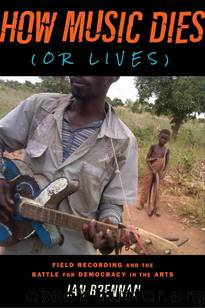How Music Dies (or Lives): Field Recording and the Battle for Democracy in the Arts by Ian Brennan

Author:Ian Brennan [Brennan, Ian]
Language: eng
Format: epub
Publisher: Allworth Press
Published: 2016-02-23T04:30:00+00:00
FIELD RECORDING CHRONICLE
ROUGH ROMANIAN SOUL:
THE ORIGINAL COWBELL
“Tell me which leave it is
that moves on a tree,
when there is no wind.”
The irony was not lost on me of being steps from Dracula’s Castle, during a full moon, while being fed a local diet heavy on garlic. And, when a sweet Transylvanian grandmother cradled my head and petted my hair, and told me she liked me so much she wanted “to eat” me, the choice of words did take one aback.
With vibraphones as the lead instrument, the band Zmeitrei takes its name from legend of a dragon that often fails and is flawed, a more humanized myth.
We recorded at the end of a road so steep the van stalled and barely made the pass. The area is called “the saddle of the outlaw,” because an eighteenth-century bandit used it as his escape route each time he terrorized the villagers in the valley.
The group wanted to set up in the attic, where they thought the sound was “dead” (. . . and that that was a good thing). Instead, we opted for a children’s playroom downstairs, amid the toys with the vocal mics positioned so that the singer Paula could look directly out the window at Mt. Omo (“Mount Man,” since it is claimed to look like a person lying in repose) as she sang. It is the highest mountain in Romania, and the one from which the purest waters in Europe reportedly spring.
In that room, the pipes from flushing toilets would occasionally flow down from above. But water sounds can be good. They are always “fluid” literally and patterned.
Drums were and are made from animal skin. And, in this case, the percussionist played his own skin (chest), “like the Gypsies do in the villages.”
Later we set up in a field with two grazing utters, literally with bells on—the original “I need more cowbell.”
Paula and Mihai said they always had a “block” when it came to writing. We experimented with them returning to the back-to-basics of how they’d started the group—as duo, with him on classical guitar. After only a few minutes, they were ready to scrub the attempt to write a new song on the spot. But with encouragement, they persisted. Paula then committed and opened her mouth like a wound. Within ten minutes they had written “I Will Find,” which sounds like an instant minstrel anthem. Having claimed to “not be a songwriter,” she went on to pen six songs in three days, the melodies pouring out of her.
One of those songs was written, by forcing the “leader” of the group to play blindfolded in a room where he could not hear the band, but they instead could follow him, as a way of freeing up the power structure of how they’d always operated.
Paula is a recovering operatic mezzo-soprano having to “forget how to sing,” in order to begin again. “But if you know how to breathe, you can do anything”—so her formidable technique is now enlisted to earthier use.
In an
Download
This site does not store any files on its server. We only index and link to content provided by other sites. Please contact the content providers to delete copyright contents if any and email us, we'll remove relevant links or contents immediately.
The Goal (Off-Campus #4) by Elle Kennedy(13657)
Kathy Andrews Collection by Kathy Andrews(11812)
Diary of a Player by Brad Paisley(7564)
Assassin’s Fate by Robin Hobb(6200)
What Does This Button Do? by Bruce Dickinson(6195)
Big Little Lies by Liane Moriarty(5790)
Altered Sensations by David Pantalony(5094)
Pale Blue Dot by Carl Sagan(4996)
Sticky Fingers by Joe Hagan(4188)
The Death of the Heart by Elizabeth Bowen(3611)
The Heroin Diaries by Nikki Sixx(3543)
Confessions of a Video Vixen by Karrine Steffans(3301)
Beneath These Shadows by Meghan March(3300)
How Music Works by David Byrne(3261)
The Help by Kathryn Stockett(3139)
Jam by Jam (epub)(3077)
Harry Potter 4 - Harry Potter and The Goblet of Fire by J.K.Rowling(3061)
Computational Linguistics and Intelligent Text Processing: 20th International Conference, CICLing 2019 La Rochelle, France, April 7â13, 2019 Revised Selected Papers, Part I by Alexander Gelbukh(2990)
Strange Fascination: David Bowie: The Definitive Story by David Buckley(2863)
